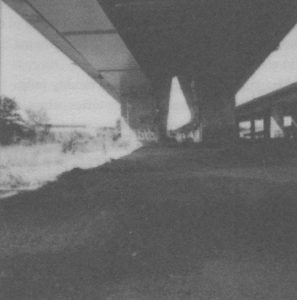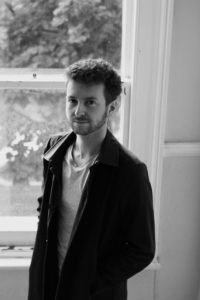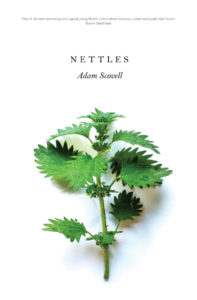Book Review – May 2022
I was weak and He was strong. I was shy and He was confident. I was afraid of violence, whereas He thrived on it. Yet, He would die, and I would kill Him.
I read the first fifty or so pages of Adam Scovell’s Nettles in bed just before putting the light out. Big mistake. His harrowing account of his protagonist’s first day at secondary school and the campaign of bullying to which he was subjected was profoundly disturbing and kept me awake for much of the night. The bully in question has no name and is simply referred to as He and Him. He is the leader of a gang of fawning acolytes and presents as an almost mythical figure, one in possession of great physical strength and animal cunning.
The book’s central character is not named either. Like Scovell himself, this character spent his childhood in the Wirral and now earns his living as a writer in London. Yet Nettles is presented as neither autofiction nor straight autobiography. It is simply an account of a writer making a journey back to the place where he was brought up and the powerful childhood memories that this stirs up. What makes Nettles so spellbinding, though, is the way Scovell seems to follow Emily Dickinson’s dictum to ‘tell all the truth but tell it slant’.
At the same time as having to deal with Him, Scovell’s protagonist has to cope with another crisis in his life: the breakdown of his parents’ marriage. Thus, at its heart, Nettles is a lament for the loss of childhood innocence and happiness. But the boy is not without his allies; the marsh and the motorway bridge just behind his school provide a place of refuge, somewhere to hide from the attentions of the bully during lunchtime and breaks. But it offers more than just a place of physical safety, the marsh offers a kind of spiritual sanctuary too. It speaks to him, it encourages him to endure and promises that in the end he will prevail and will defeat the bully for good: ‘He will die.’
But such an outcome demands a sacrifice in return, or so it seems to this desperate and frightened child. Speaking to a teacher or telling his parents about the bullying is never an option in the mind of the boy. Indeed, he makes great efforts to hide his cuts, bruises and torn clothing from them. He keeps covered too the angry weals on his legs where his bare skin was thrashed with nettle stems on the way back from games. To complain, he tells himself, would only result in more severe persecution. Instead he communes with the marsh and bides his time.
I had fallen into the habit of talking to the marsh, aiming words under the motorway but firm in the belief that they were heard. Sometimes the marsh replied, but I could never remember what was said.
The boy, now a writer in London, returns to the Wirral for a few days and stays with his mother in the old family home which she shares with her new partner. The couple are due to move to another home in North Wales very shortly and the writer needs to sort through the many boxes of stuff stored in his old room. This is the detritus of his childhood and teens, the things accumulated by by a bright, sensitive youngster obsessed with film, horror and science fiction.
 The writer ponders his childhood, exploring his memories of his parents, school, the marsh and Him. He revisits some of his old haunts and takes polaroid snaps, several of which are reproduced in monochrome in the book. He walks to the Breck, a rocky outcrop in a disused quarry near his old home, a place which played a significant part in the battle against Him.
The writer ponders his childhood, exploring his memories of his parents, school, the marsh and Him. He revisits some of his old haunts and takes polaroid snaps, several of which are reproduced in monochrome in the book. He walks to the Breck, a rocky outcrop in a disused quarry near his old home, a place which played a significant part in the battle against Him.
Nettles succeeds in capturing the very essence of the Wirral, its strangeness. It is a place between two estuaries, a peninsula facing the Welsh hills in one direction and Liverpool and the shores of the Mersey in the other. Not quite England and decidedly not Wales. It is a Viking outpost; its coast, semi-urban settlements, woodlands and marshes holding memories and nurturing myths. Adam Scovell delves into his own memories, but touches on something deeper, more universal. In doing so he gives us a hint, a brief glimpse, of that which lies beneath the primordial soil of the place he calls home.
Adam Scovell
 Adam Scovell is a writer from Merseyside now based in London. He completed his PhD in Music at Goldsmiths in 2018. He has written for the BFI, Literary Hub, Financial Times, Little White Lies, and the BBC as well as many other outlets. He is the author of Folk Horror: Hours Dreadful and Things Strange (Auteur, 2017), Mothlight (Influx Press, 2019), and How Pale the Winter Has Made Us (Influx Press, 2020).
Adam Scovell is a writer from Merseyside now based in London. He completed his PhD in Music at Goldsmiths in 2018. He has written for the BFI, Literary Hub, Financial Times, Little White Lies, and the BBC as well as many other outlets. He is the author of Folk Horror: Hours Dreadful and Things Strange (Auteur, 2017), Mothlight (Influx Press, 2019), and How Pale the Winter Has Made Us (Influx Press, 2020).


Oof, sounds too disturbing for me, but a powerful evocation of place, of course.
It’s a tough read in parts, but ultimately very rewarding.